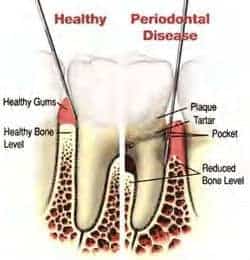What is Periodontal Maintenance?
I recently had scaling and root planing performed by my periodontist, and now she wants me to come back four times a year for periodontal maintenance. I am a little concerned because I have always heard that you should go to the dentist for cleaning and maintenance twice a year. Why the extra maintenance?
Michael in Florida
Hi Michael,
It’s great that you got your periodontal disease treated with scaling and root planing, but it sounds like maybe your periodontist just didn’t provide enough information about the follow-up treatment. Periodontal maintenance is needed to keep your periodontal disease from returning. So let’s see if we can’t give you the reassurance you need to continue keeping your teeth healthy.
Periodontal disease is a chronic condition. There is no “cure” for it, but with proper treatment and continued maintenance, you can keep it from loosening your teeth and causing other health problems.
Scaling and root planing is usually performed to eradicate the current causes of the disease: these are pockets of bacteria that form under the gums that undermine the underlying structures that support the teeth. That is why this disease is so damaging. It breaks down the tooth itself as well as the soft tissues and bone that hold it in place.

Periodontal maintenance is a two-fold process with both at-home and in-office steps. The at-home steps involve effective hygiene. This means that you will need to be very careful about brushing and flossing every time you eat. Once you have periodontal disease, you can no longer afford to skip this step.
The corresponding in-office step is the maintenance cleanings your periodontist recommended. They need to be more frequent to prevent the disease from returning. In addition, these maintenance cleanings require that the hygienist have more training and skill, and you can expect that they will take longer as well.
Think of it this way: if you do all you can to keep up with your at-home hygiene and return regularly for your maintenance cleanings, you may never have to experience another scaling and root planing procedure or the more severe aspects of untreated periodontal disease.
Good luck to you in maintaining your dental and overall health with regular cleanings.
This Blog is brought to you by David Pumphrey of Pumphrey Periodontics in Atlanta.







